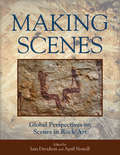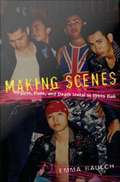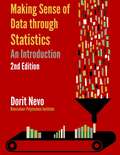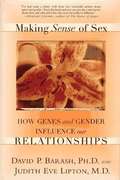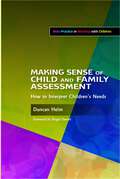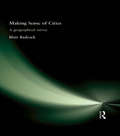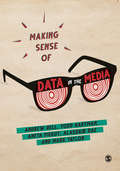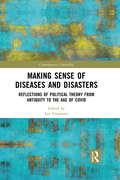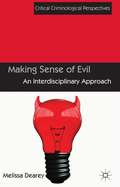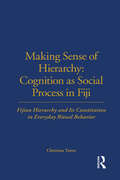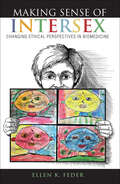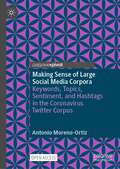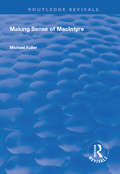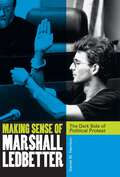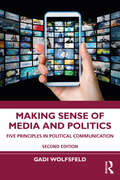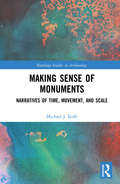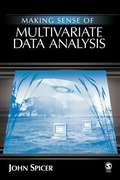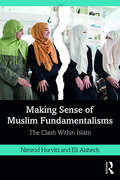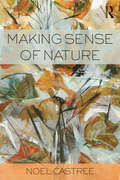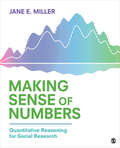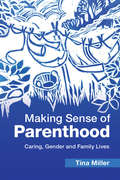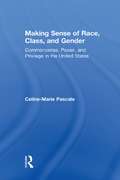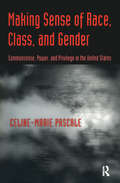- Table View
- List View
Making Scenes: Global Perspectives on Scenes in Rock Art
by Iain Davidson and April NowellDating back to at least 50,000 years ago, rock art is one of the oldest forms of human symbolic expression. Geographically, it spans all the continents on Earth. Scenes are common in some rock art, and recent work suggests that there are some hints of expression that looks like some of the conventions of western scenic art. In this unique volume examining the nature of scenes in rock art, researchers examine what defines a scene, what are the necessary elements of a scene, and what can the evolutionary history tell us about storytelling, sequential memory, and cognitive evolution among ancient and living cultures?
Making Scenes: Reggae, Punk, and Death Metal in 1990s Bali
by Emma BaulchIn 1996, Emma Baulch went to live in Bali to do research on youth culture. Her chats with young people led her to an enormously popular regular outdoor show dominated by local reggae, punk, and death metal bands. In this rich ethnography, she takes readers inside each scene: hanging out in the death metal scene among unemployed university graduates clad in black T-shirts and ragged jeans; in the punk scene among young men sporting mohawks, leather jackets, and hefty jackboots; and among the remnants of the local reggae scene in Kuta Beach, the island's most renowned tourist area. Baulch tracks how each music scene arrived and grew in Bali, looking at such influences as the global extreme metal underground, MTV Asia, and the internationalization of Indonesia's music industry. Making Scenes is an exploration of the subtle politics of identity that took place within and among these scenes throughout the course of the 1990s. Participants in the different scenes often explained their interest in death metal, punk, or reggae in relation to broader ideas about what it meant to be Balinese, which reflected views about Bali's tourism industry and the cultural dominance of Jakarta, Indonesia's capital and largest city. Through dance, dress, claims to public spaces, and onstage performances, participants and enthusiasts reworked "Balinese-ness" by synthesizing global media, ideas of national belonging, and local identity politics. Making Scenes chronicles the creation of subcultures at a historical moment when media globalization and the gradual demise of the authoritarian Suharto regime coincided with revitalized, essentialist formulations of the Balinese self.
Making Sense Of Data Through Statistics: An Introduction
by Dorit Nevo"This introductory statistics textbook exposes students to statistical techniques in a user-friendly approach emphasizing the sense-making nature of statistics. The Second Edition adds new content on business analytics, enhances explanations of key concepts and techniques, and incorporates updated examples and exercises. The target audience includes undergraduate or graduate students taking a first course in statistics. As the texts examples and exercises emphasize problems and questions that reference todays social and business contexts, these examples and exercises resonate extremely well with students. The textbook is accompanied with data sets (provided as Excel worksheets) providing students with a hands-on experience in using Excel to reinforce the statistical concepts and techniques covered. Topics are covered using very accessible language and a conversational style. Numerous examples and problems, constructed around issues taken from students everyday life experiences, are woven into the text to enhance and simplify the learning process. Key words, unit summaries, unit exercises and end-of-chapter exercises are included within each chapter; and, appendices are provided describing all the equations and Excel functions introduced in the text.
Making Sense Of Sex: How Genes And Gender Influence Our Relationships
by David P. Barash Judith Eve LiptonWhy do most women prefer romance, and men, sex? Why do women live longer than men? Why are men willing to pay for sex while women almost never are? Why are women nearly always the primary caregivers of young children? What happens when a man's brain is trapped in a woman's body? When is a short, balding middle-aged man more attractive than a tall, handsome, young one? In Making Sense of Sex, the husband-and-wife team of David Barash, an evolutionary biologist, and Judith Lipton, a clinical psychiatrist, draw on their respective areas of expertise to explore and explain the central fact of our existence -- that men and women are fundamentally, unalterably different. They present an eye-opening and wide-ranging consideration of what those differences are, how they came to be, why they are important, and what they mean in our everyday lives. The authors integrate biological and anthropological findings with real-life stories of indviduals to address the conundrums that surround male-female behavior and relationships. Drawing on the latest research in evolutionary biology, they trace the multifaceted gender gap to the basic, defining difference between males and females: that one makes sperm, the other, eggs. They show how that distinction explains why women and men differ in essential ways, exploring such questions as: Why are men more attracted than women to pornography, group sex, and one-night stands? Why are women the "gatekeepers" of sex? Why do women have orgasms?Making Sense of Sex is a highly informative and entertaining look at human relationships. The book will help readers not only to better understand themselves, but to better understand their children, their relatives, and their lovers with whom they share so much yet find so infuriatingly and fascinatingly different.
Making Sense of Child and Family Assessment
by Duncan HelmThe application of assessment frameworks hinges on human qualities and skills which are naturally prone to bias and inconsistency. Making Sense of Child and Family Assessment aims to support workers in analysing and making sense of the information gathered, and increasing accuracy and empathy in assessing the needs and risks for vulnerable children and young people. This book offers best practice guidance on how to analyse information gathered during the assessment of children and young people and their families. Good assessments take time and need to be appropriately resourced. A range of analytical tools are also needed if practitioners are to present assessments of children's needs which lead to meaningful care plans and improved outcomes. Helm introduces the key messages emerging from policy and research, and provides insights into today's multi-disciplinary practice. Professionals working in child welfare and protection roles, such as social workers, health visitors, midwives and teachers will find this practical guide to analysis invaluable in interpreting needs and outcomes.
Making Sense of Cities: A geographical survey (A\hodder Arnold Publication)
by Blair BadcockIn 2000, for the first time, a majority of the world's population was living in cities. The trend towards increasing urbanization shows no sign of slowing and the third millennium looks set to be an unprecedentedly urban one.'Making Sense of Cities' provides an up-to-date, vibrant and accessible introduction to urban geography. It offers students a sense of the patterns and processess of urbanization and the spatial organisation of cities, recognizing the significance of globalization, economics, politics and culture from a range of perspectives. Above all, it seeks to provide a relevant approach, inviting students to engage with competing theories of the urban and to assess them against the background of their own opinions and personal experience.Examples and case studies are drawn from a range of international settings, from San Francisco to Shanghai, Sydney to Singapore, giving a genuinely global coverage. The book is written in a fresh and engaging stlye, and is fully illustrated throughout. It is designed to appeal to any student of the urban and will be essential to students of geography, urban studies, town planning and land economy.
Making Sense of Data in the Media: A Guide For Social Scientists
by Dr. Andrew Bell Dr. Todd Hartman Dr. Aneta Piekut Alasdair Rae Dr. Mark TaylorThe amount of data produced, captured and transmitted through the media has never been greater. But for this data to be useful, it needs to be properly understood and claims made about or with data need to be properly scrutinized. Through a series of examples of statistics in the media, this book shows you how to critically assess the presentation of data in the media, to identify what is significant and to sort verifiable conclusions from misleading claims. How accurate are polls, and how should we know? How should league tables be read? Are numbers presented as &‘large&’ really as big as they may seem at first glance? By answering these questions and more, readers will learn a number of statistical concepts central to many undergraduate social science statistics courses. But more than this, by tying them in to real life examples, the importance and relevance of these concepts comes to life. As such, this book does more than teaches techniques needed for a statistics course; it teaches you life skills that we need to use every single day.
Making Sense of Data in the Media: A Guide For Social Scientists
by Mark Taylor Andrew Bell Alasdair Rae Todd Hartman Aneta PiekutThe amount of data produced, captured and transmitted through the media has never been greater. But for this data to be useful, it needs to be properly understood and claims made about or with data need to be properly scrutinized. Through a series of examples of statistics in the media, this book shows you how to critically assess the presentation of data in the media, to identify what is significant and to sort verifiable conclusions from misleading claims. How accurate are polls, and how should we know? How should league tables be read? Are numbers presented as ‘large’ really as big as they may seem at first glance? By answering these questions and more, readers will learn a number of statistical concepts central to many undergraduate social science statistics courses. By tying them in to real life examples, the importance and relevance of these concepts comes to life. As such, this book does more than teaches techniques needed for a statistics course; it teaches you life skills that we need to use every single day.
Making Sense of Diseases and Disasters: Reflections of Political Theory from Antiquity to the Age of COVID (Contemporary Liminality)
by Lee TrepanierThis book examines diseases and disasters from the perspective of social and political theory, exploring the ways in which political leaders, social activists, historians, philosophers, and writers have tried to make sense of the catastrophes that have plagued humankind from Thucydides to the present COVID pandemic. By adopting the perspective of political theory, it sheds light on what these individuals and events can teach us about politics, society, and human nature, as well as the insights and limitations of political theory. Including thinkers such as Thucydides, Sophocles, Augustine, Bacon, Locke, Hume, Rousseau, Publius, Bartolomé de las Casas, Jane Addams, Camus, Saramago, Baudrillard, Weber, Schmitt, Voegelin and Agamben, it considers a diverse range of events including the plagues of Byzantium and 14th century Europe, 9/11, the hurricanes of Fukushima, Boxing Day, and New Orleans, and the current COVID pandemic. An examination of past, present, and future diseases and disasters, and the ways in which individuals and societies react to them, this volume will appeal to scholars of politics, sociology, anthropology and philosophy with interests in disaster and the social body.
Making Sense of Evil
by Melissa DeareyWhen it comes to crime, everyone seems to take evil seriously as an explanatory concept - except criminologists. This book asks why, and why not, through exploring a variety of interdisciplinary approaches to evil from the perspectives of theology, philosophy, literary and cultural studies, and the social sciences.
Making Sense of Hierarchy: Fijian Hierarchy and Its Constitution in Everyday Ritual Behavior (London School Of Economics Monographs On Social Anthropology Ser. #Vol. 61)
by Christina TorenAnalyses Fijian hierarchy and its constitution in everyday ritual behaviour. The author spent July 1981 to February 1983 in Fiji, eighteen months of the time being spent in the chiefly village of Sawaieke on the island of Gau. This book is collection of her field research.
Making Sense of Intersex: Changing Ethical Perspectives in Biomedicine
by Ellen K. FederA philosopher offers a framework for the treatment of intersex children, and a moral argument for responsibility to them and their families.Putting the ethical tools of philosophy to work, Ellen K. Feder seeks to clarify how we should understand “the problem” of intersex. Adults often report that medical interventions they underwent as children to “correct” atypical sex anatomies caused them physical and psychological harm. Proposing a philosophical framework for the treatment of children with intersex conditions—one that acknowledges the intertwined identities of parents, children, and their doctors—Feder presents a persuasive moral argument for collective responsibility to these children and their families.“In a voice both urgent and nuanced, Feder squarely faces the complexities that accompany the care of people with atypical sex anatomies in medical science. . . . Rich with cross-discipline potential, Feder’s engaging argument should provide a new approach for doctors and parents caring for children with atypical sex anatomy.” —Publishers Weekly, starred review“Feder’s book is a welcome injection of new ideas into feminist scholarship on intersex, post-Consensus Statement era.” —Women’s Review of Books“Is a work of philosophy capable of bringing insightful new perspectives or illuminating and forceful arguments to an urgent social matter so as truly to effect a felt change in the lives of people concerned by it? Feder’s book is capable of this effect. As such, it takes the risk of calling forth a new public, or a new readership, and so is a work whose appeal could well be ahead of its time. But its time should be here.” —International Journal of Feminist Approaches to Bioethics“Making Sense of Intersex significantly enhances our understanding of intersex and the ethical issues involved in medical practice more generally.” —Kennedy Institute of Ethics Journal
Making Sense of Large Social Media Corpora: Keywords, Topics, Sentiment, and Hashtags in the Coronavirus Twitter Corpus
by Antonio Moreno-OrtizThis open access book offers a comprehensive overview of available techniques and approaches to explore large social media corpora, using as an illustrative case study the Coronavirus Twitter corpus. First, the author describes in detail a number of methods, strategies, and tools that can be used to access, manage, and explore large Twitter/X corpora, including both user-friendly applications and more advanced methods that involve the use of data management skills and custom programming scripts. He goes on to show how these tools and methods are applied to explore one of the largest Twitter datasets on the COVID-19 pandemic publicly released, covering the two years when the pandemic had the strongest impact on society. Specifically, keyword extraction, topic modelling, sentiment analysis, and hashtag analysis methods are described, contrasted, and applied to extract information from the Coronavirus Twitter Corpus. The book will be of interest to students and researchers in fields that make use of big data to address societal and linguistic concerns, including corpus linguistics, sociology, psychology, and economics.
Making Sense of MacIntyre (Routledge Revivals)
by Michael FullerFirst published in 1998, this influential volume undertakes a task of exposition and interpretation in explaining the views of this important yet elusive ethical philosopher and why he thought modern moral and political philosophy so muddled. Fuller places MacIntyre in his philosophical context, draws out his attitudes towards ethical issues and attempts to uncover and explain his influences. In four parts, Fuller explores the board outline of MacIntyre’s position, casuistry and the nature of tethics, MacIntyre’s arguments on truth and reason and lastly his notions of narrative unity, ethical justification, tradition along with views on fact, theory and value.
Making Sense of Marshall Ledbetter: The Dark Side of Political Protest
by Daniel M. HarrisonArmed with an empty whiskey bottle and wearing a tie-dyed Jimi Hendrix T-shirt, Florida State University dropout Marshall Ledbetter broke into the Florida State Capitol early one morning in June 1991. He occupied the Sergeant of Arms suite, demanding an extra-large Gumby’s pizza and 666 donuts for the cops waiting outside. He hoped to garner media attention for his protest of poverty, homelessness, and cuts to higher education.After an eight hour standoff, Ledbetter was betrayed by the very media he had counted on to tell his story; his demands were not broadcast on CNN as he had been promised but streamed into the office on closed-circuit TV. Although he left the building peacefully, the ensuing trial, his trips in and out of the state’s mental health institutions over the following decade, and his eventual suicide in 2003 speak to how difficult it is to untangle addiction, isolation, brilliance, and deviance.Ledbetter’s invasion of the Capitol remains the biggest security breach of the building’s history, but Daniel Harrison’s telling of the Ledbetter saga is about more than one misguided young man’s breaking and entering into the state’s most secure building. Making Sense of Marshall Ledbetter thoughtfully and honestly explores the ways society manages deviant people in real world situations and whether or not our law enforcement and justice systems are adequately equipped to handle mental illness.
Making Sense of Media and Politics: Five Principles in Political Communication
by Gadi WolfsfeldIn Making Sense of Media and Politics, Gadi Wolfsfeld introduces readers to the most important concepts for examining the interrelationship of media and politics. Five major principles are used to summarize the major arguments: Political power can usually be translated into power over all forms of media. When the powerful lose control over the political environment, they also lose control over all forms of media. Every political story that appears in every form of media is biased. All forms of media are primarily dedicated to telling good stories, which can have a major impact on political processes. Many of the most important effects of the various forms of media on citizens tend to be unintentional and unnoticed. By identifying these five key principles of political communication, Wolfsfeld examines those who package and send political messages, those who transform political messages into stories, and the effects this can have on citizens, and how the more active members of the public ("users") can initiate their own stories. The result is a brief, engaging guide to help make sense of the wider world of media and politics and an essential companion to more in-depths studies of the field. New to the Second Edition Up-to-date coverage of major political events in the last decade, including the landmark US elections of 2016 and 2020. Devotes more attention to the "hybrid media system" that has developed over the last decade, providing a greater balance between traditional "news" and social media in particular. Includes more cross-national research, especially in non-Western and non-democratic countries. Refines the five principles of political communication to better reflect contemporary media trends. Covers key emerging topics including misinformation and threats to democratic institutions, new forms of political engagement, and the economic base of the various forms of media.
Making Sense of Monuments: Narratives of Time, Movement, and Scale (Routledge Studies in Archaeology)
by Michael J. KolbStonehenge, Machu Picchu, Confederate statues, Egyptian pyramids, and medieval cathedrals: these are some of the places that are the subject of Making Sense of Monuments, an analysis of how the built environment molds human experiences and perceptions via bodily comparison. Drawing from recent research in cognitive neuroscience, psychology, and semiotics, Michael J. Kolb explores the mechanics of the mind, the material world, and the spatialization process of monumental architecture. Three distinct spatial-cognitive metaphors—time, movement, and scale—comprise strands of knowledge that when interwoven create embodied contours of meaning of how human interact with monumental spaces. Comprehensive, lucidly written, and thoroughly illustrated, Making Sense of Monuments is a vibrant, extraordinary journey of the monuments we have constructed and inhabited.
Making Sense of Multivariate Data Analysis
by John SpicerMaking Sense of Multivariate Data Analysis is a short introduction to multivariate data analysis (MDA) for students and practitioners in the behavioral and social sciences. It provides a conceptual overview of the foundations of MDA and of a range of specific techniques including multiple regression, logistic regression, discriminant analysis, multivariate analysis of variance, factor analysis, and log-linear analysis. As a conceptual introduction, the book assumes no prior statistical knowledge, and contains very few symbols or equations. Its primary objective is to expose the conceptual unity of MDA techniques both in their foundations and in the common analytic strategies that lie at the heart of all of the techniques. Although introductory, the book encourages the reader to reflect critically on the general strengths and limitations of MDA techniques. Each chapter includes references for further reading accessible to the beginner.
Making Sense of Muslim Fundamentalisms: The Clash Within Islam
by Nimrod Hurvitz Eli AlshechStudying Muslim fundamentalisms, this book compares key movements, examining their commonalities, differences, and intricate relations, as well as their achievements and failures. Muslim fundamentalisms have the sympathy of approximately half of the Muslim population in the world. Yet, they are divided among themselves and are in a constant state of controversy. The research dwells on the leading fundamentalist movements, such as the Muslim Brothers, Tablighi-Jamaʻat, al-Qaeda, and ISIS, and illustrates how differently they think about the West and its culture, democracy, and women’s presence in the public sphere. By identifying these trends, and studying them comparatively, the book enables the interested reader to make sense of the plethora of fundamentalist movements, which are otherwise lumped together by the media and are barely discernible for the reader. Whereas most studies of Muslim fundamentalism focus on organizational or militant actions that the movements perform, this study concentrates on their efforts to Islamize society through everyday life in a peaceful manner. Identifying the different strands of Muslim fundamentalisms, the book will be a key resource to a wide range of readers including researchers and students interested in politics, religious, Islamic and Middle Eastern Studies.
Making Sense of Nature
by Noel CastreeWe listen to a cacophony of voices instructing us how to think and feel about nature, including our own bodies. The news media, wildlife documentaries, science magazines, and environmental NGOs are among those clamouring for our attention. But are we empowered by all this knowledge or is our dependence on various communities allowing our thoughts, sentiments and activities to be unduly governed by others? Making Sense of Nature shows that what we call ‘nature’ is made sense of for us in ways that make it central to social order, social change and social dissent. By utilising insights and extended examples from anthropology, cultural studies, human geography, philosophy, politics, sociology, science studies, this interdisciplinary text asks whether we can better make sense of nature for ourselves, and thus participate more meaningfully in momentous decisions about the future of life – human and non-human – on the planet. This book shows how ‘nature’ can be made sense of without presuming its naturalness. The challenge is not so much to rid ourselves of the idea of nature and its ‘collateral concepts’ (such as genes) but instead, we need to be more alert to how, why and with what effects ideas about ‘nature’ get fashioned and deployed in specific situations. Among other things, the book deals with science and scientists, the mass media and journalists, ecotourism, literature and cinema, environmentalists, advertising and big business. This innovative text contains numerous case studies and examples from daily life to put theory and subject matter into context, as well as study tasks, a glossary and suggested further reading. The case studies cover a range of topics, range from forestry in Canada and Guinea, to bestiality in Washington State, to how human genetics is reported in Western newspapers, to participatory science experiments in the UK. Making Sense of Nature will empower readers from a wide range of fields across the social sciences, humanities and physical sciences.
Making Sense of Numbers: Quantitative Reasoning for Social Research
by Jane E. MillerMaking Sense of Numbers teaches students the skills they need to be both consumers and producers of quantitative research: able to read about, collect, calculate, and communicate numeric information for both everyday tasks and school or work assignments. The text teaches how to avoid making common errors of reasoning, calculation, or interpretation by introducing a systematic approach to working with numbers, showing students how to figure out what a particular number means. The text also demonstrates why it is important to apply a healthy dose of skepticism to the numbers we all encounter, so that we can understand how those numbers can (and cannot) be interpreted in their real-world context. Jane E. Miller uses annotated examples on a wide variety of topics to illustrate how to use new terms, concepts, and approaches to working with numbers. End-of-chapter engagement activities designed based on Miller’s three decades of teaching experience can be used in class or as homework assignments, with some for students to do individually and others intended for group discussion. The book is ideally suited for a range of courses, including quantitative reasoning, research methods, basic statistics, data analysis, and communicating quantitative information. An instructor website for the book includes a test bank and editable PowerPoint slides.
Making Sense of Numbers: Quantitative Reasoning for Social Research
by Jane E. MillerMaking Sense of Numbers teaches students the skills they need to be both consumers and producers of quantitative research: able to read about, collect, calculate, and communicate numeric information for both everyday tasks and school or work assignments. The text teaches how to avoid making common errors of reasoning, calculation, or interpretation by introducing a systematic approach to working with numbers, showing students how to figure out what a particular number means. The text also demonstrates why it is important to apply a healthy dose of skepticism to the numbers we all encounter, so that we can understand how those numbers can (and cannot) be interpreted in their real-world context. Jane E. Miller uses annotated examples on a wide variety of topics to illustrate how to use new terms, concepts, and approaches to working with numbers. End-of-chapter engagement activities designed based on Miller’s three decades of teaching experience can be used in class or as homework assignments, with some for students to do individually and others intended for group discussion. The book is ideally suited for a range of courses, including quantitative reasoning, research methods, basic statistics, data analysis, and communicating quantitative information.
Making Sense of Parenthood: Caring, Gender and Family Lives
by Tina MillerFollowing on from Making Sense of Motherhood (2005) and Making Sense of Fatherhood (2010), Tina Miller's book focuses on transitions to first-time parenthood and the unfolding experiences of managing caring and paid work in modern family lives. Returning to her original participants, it collects later episodes of their experience of 'doing' family life, and meticulously examines mothers' and fathers' accounts of negotiating intensified parenting responsibilities and work-place demands. It explores questions of why gender equality and equity are harder to manage within the home sphere when organising caring and associated responsibilities, re-addressing the concept of 'maternal gatekeeping' and offering insights into a new concept of 'paternal gatekeeping'. The findings presented will inform both scholarly work and policy on family lives, gender equality and work.
Making Sense of Race, Class, and Gender: Commonsense, Power, and Privilege in the United States
by Celine-Marie PascaleUsing arresting case studies of how ordinary people understand the concepts of race, class, and gender, Celine-Marie Pascale shows that the peculiarity of commonsense is that it imposes obviousness—that which we cannot fail to recognize. As a result, how we negotiate the challenges of inequality in the twenty-first century may depend less on what people consciously think about "difference" and more on what we inadvertently assume. Through an analysis of commonsense knowledge, Pascale expertly provides new insights into familiar topics. In addition, by analyzing local practices in the context of established cultural discourses, Pascale shows how the weight of history bears on the present moment, both enabling and constraining possibilities. Pascale tests the boundaries of sociological knowledge and offers new avenues for conceptualizing social change. In 2008, Making Sense of Race, Class and Gender was the recipient of the Distinguished Contribution to Scholarship Book Award, of the American Sociological Association Section on Race, Gender, and Class, for "distinguished and significant contribution to the development of the integrative field of race, gender, and class."
Making Sense of Race, Class, and Gender: Commonsense, Power, and Privilege in the United States
by Celine-Marie PascaleUsing arresting case studies of how ordinary people understand the concepts of race, class, and gender, Celine-Marie Pascale shows that the peculiarity of commonsense is that it imposes obviousness-that which we cannot fail to recognize. As a result, how we negotiate the challenges of inequality in the twenty-first century may depend less on what people consciously think about "difference" and more on what we inadvertently assume. Through an analysis of commonsense knowledge, Pascale expertly provides new insights into familiar topics. In addition, by analyzing local practices in the context of established cultural discourses, Pascale shows how the weight of history bears on the present moment, both enabling and constraining possibilities. Pascale tests the boundaries of sociological knowledge and offers new avenues for conceptualizing social change.
